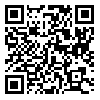BibTeX | RIS | EndNote | Medlars | ProCite | Reference Manager | RefWorks
Send citation to:
URL: http://irancounseling.ir/journal/article-1-294-en.html
Aim: The aim of this reasarch was to grounded Employees's Boundaryless Career Attitudes. This reasarch was an explantory mixed research of selecting participant.
Method: The statistic population of this research was the employees of Isfahan's engineered companies. In the quantitative process, the samples were 200 employees who were selected by cluster sampling method and in gualitative process 15 employees were selected by purposeful sampling. Boundaryless Career Attitudes Scale, Proactive Personality Scale and deep survery were used for gathering data. In quantitative process for selecting boundaryless and traditional employees, psychometric properties and Factor structure of boundaryless career attitudes scale were analyzed by using confirmatory factor analysis. In gualitative process data were analyzed by using grounded theory and in three stage: open coding, axial coding, selective codingtric.
Finding: The results of the confirmafory factor analysis, showed that confirmed the factor-second order model and revealed that the Boundaryless Mindset and Organizational Mobility Preference were two seprated and indepent component of boundaryless career. The qualitative's results revealed that "individual construction" is the most important construction of this attitudes. This construction consists of 28 categories in boundaryless employees and 5 categories in traditional employees.
Results: Individual constructions is the most important construction of boundaryless career attitudes and it investigat by three section: causes, strategy and result.
Received: 2016/05/8 | Accepted: 2017/02/26 | Published: 2017/09/7
| Rights and permissions | |
 |
This work is licensed under a Creative Commons Attribution-NonCommercial 4.0 International License. |


